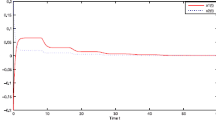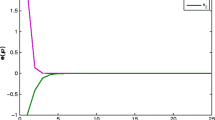Abstract
A new definition of dissipativity for neural networks is presented in this paper. By constructing proper Lyapunov functionals and using some analytic techniques, sufficient conditions are given to ensure the dissipativity of neural networks with or without time-varying parametric uncertainties and the integro-differential neural networks in terms of linear matrix inequalities. Numerical examples are given to illustrate the effectiveness of the obtained results.
Similar content being viewed by others
References
T. P. Chen. Global Exponential Stability of Delayed Hopfield Neural Networks. Neural Networks, vol. 14, no. 8, pp. 977–980, 2001.
X. F. Liao, C. D. Li. An LMI Approach to Asymptotical Stability of Multi-delayed Neural Networks. Physica D: Nonlinear Phenomena, vol. 200, no. 1–2, pp. 139–155, 2005.
B. T. Cui, X. Y. Lou. Global Asymptotic Stability of BAM Neural Networks with Distributed Delays and Reaction-diffusion Terms. Chaos, Solitions & Fractals, vol. 27, no. 5, pp. 1347–1354, 2006.
X. Y. Lou, B. T. Cui. Global Asymptotic Stability of Delay BAM Neural Networks with Impulses. Chaos, Solitons & Fractals, vol. 29, no. 4, pp. 1023–1031, 2006
X. Y. Lou, B. T. Cui. On the Global Robust Asymptotic Stability of BAM Neural Networks with Time-varying Delays. Neurocomputing, vol. 70, no. 1–3, pp. 273–279, 2006.
Q. K. Song, Z. J. Zhao. Global Dissipativity of Neural Networks with Both Variable and Unbounded Delays. Chaos, Solitons & Fractals, vol. 25, no. 2, pp. 393–401, 2005.
L. Xie, M. Fu, H. Li. Passivity Analysis for Uncertain Signal Processing Systems. IEEE Transactions on Signal Processing, vol. 49, no. 9, pp. 2394–2403, 1998.
W. Yu. Passivity Analysis for Dynamic Multilayer Neuro Identifier. IEEE Transactions on Circuits and Systems I: Fundamental Theory and Applications, vol. 50, no. 1, pp. 173–178, 2003.
C. G. Li, X. F. Liao. Passivity Analysis of Neural Networks with Time Delay. IEEE Transactions on Circuits and Systems II: Express Briefs, vol. 52, no. 8, pp. 471–475, 2005.
X. X. Liao, J. Wang. Global Dissipativity of Continuous-time Recurrent Neural Networks with Time Delay. Physical Review, vol. 68, no. 1, pp. 1–7, 2003.
S. Arik. On the Global Dissipativity of Dynamical Neural Networks with Time Delays. Physics Letters A, vol. 326, no. 1–2, pp. 126–132, 2004.
X. Y. Lou, B. T. Cui. Global Robust Dissipativity for Integro-differential Systems Modeling Neural Networks with Delays. Chaos, Solitons & Fractals, vol. 36, no. 2, pp. 469–478, 2008.
W. Yu, X. Li. Some New Results on System Identification with Dynamic Neural Networks. IEEE Transactons on Neural Networks, vol. 12, no. 2, pp. 421–417, 2001.
J. C. Willems. Dissipative Dynamical Systems, Part I: General Theory. Archive for Rational Mechanics and Analysis, vol. 45, no. 5, pp. 321–351, 1972.
Z. H. Li, J. C. Wang, H. H. Shao. Delay-dependent Dissipative Control for Linear Time-delay Systems. Journal of the Franklin Institute, vol. 339, no. 6–7, pp. 529–542, 2002.
L. Xie. Robust Output Feedback Dissipative Control for Uncertain Nonlinear Systems. In Proceedings of the 5th World Congress on Intelligent Control and Automation, IEEE Press, Hangzhou, PRC, pp. 809–813, 2004.
W. Yu, X. Li. Some Stability Properties of Dynamic Neural Networks. IEEE Transactions on Circuits and Systems I: Fundamental Theory and Applications, vol. 48, no. 2, pp. 256–259, 2001.
S. I. Niculescu, R. Lozano. On the Passivity of Linear Delay Systems. IEEE Transactions on Automatic Control, vol. 46, no. 3, pp. 460–464, 2001.
Z. K. Song, Z. J. Zhao. Global Dissipativity of Neural Networks with Both Variable and Unbounded Delays. Chaos, Solitons & Fractals, vol. 25, no. 2, pp. 393–401, 2005.
J. D. Cao, D. S. Huang, Y. Z. Qu. Global Robust Stability of Delayed Recurrent Neural Networks. Chaos, Solitons & Fractals, vol. 23, no. 1, pp. 221–229, 2005.
J. H. Park. Further Results on Passivity Ananlysis of Delayed Cellular Neural Networks. Chaos, Solitons & Fractals, vol. 34, no. 5, pp. 1546–1551, 2007.
X. Y. Lou, B. T. Cui. Passivity Analysis of Integro-differential Neural Networks with Time-varying Delays. Neurocomputing, vol. 70, no. 4–6, pp. 1071–1078, 2007.
Author information
Authors and Affiliations
Corresponding author
Additional information
This work was supported by National Natural Science Foundation of China (No. 60674026), Key Project of Chinese Ministry of Education (No. 107058), Jiangsu Provincial Natural Science Foundation of China (No. BK2007016).
Yan Sun received the B. Sc. degree from Zhengzhou University, PRC, in 2005. She is now a master student in the School of Communication and Control Engineering, Jiangnan University, PRC.
Her research interests include dissipative control and energy decoupling.
Bao-Tong Cui received the Ph.D. degree in control theory and control engineering from the College of Automation Science and Engineering, South China University of Technology, PRC, in July 2003. He was a post-doctoral fellow at Shanghai Jiaotong University, PRC, from July 2003 to September 2005, and a visiting scholar at Department of Electrical and Computer Engineering, National University of Singapore from August 2007 to February 2008. He became an associate professor in December 1993 and a professor in November 1995 at Department of Mathematics, Binzhou University, Shandong, PRC. He joined the School of Communication and Control Engineering, Jiangnan University, PRC, in June 2003, where he is a professor.
His research interests include systems analysis, stability theory, impulsive control, artificial neural networks, and chaos synchronization.
Rights and permissions
About this article
Cite this article
Sun, Y., Cui, BT. Dissipativity analysis of neural networks with time-varying delays. Int. J. Autom. Comput. 5, 290–295 (2008). https://doi.org/10.1007/s11633-008-0290-x
Received:
Revised:
Published:
Issue Date:
DOI: https://doi.org/10.1007/s11633-008-0290-x




